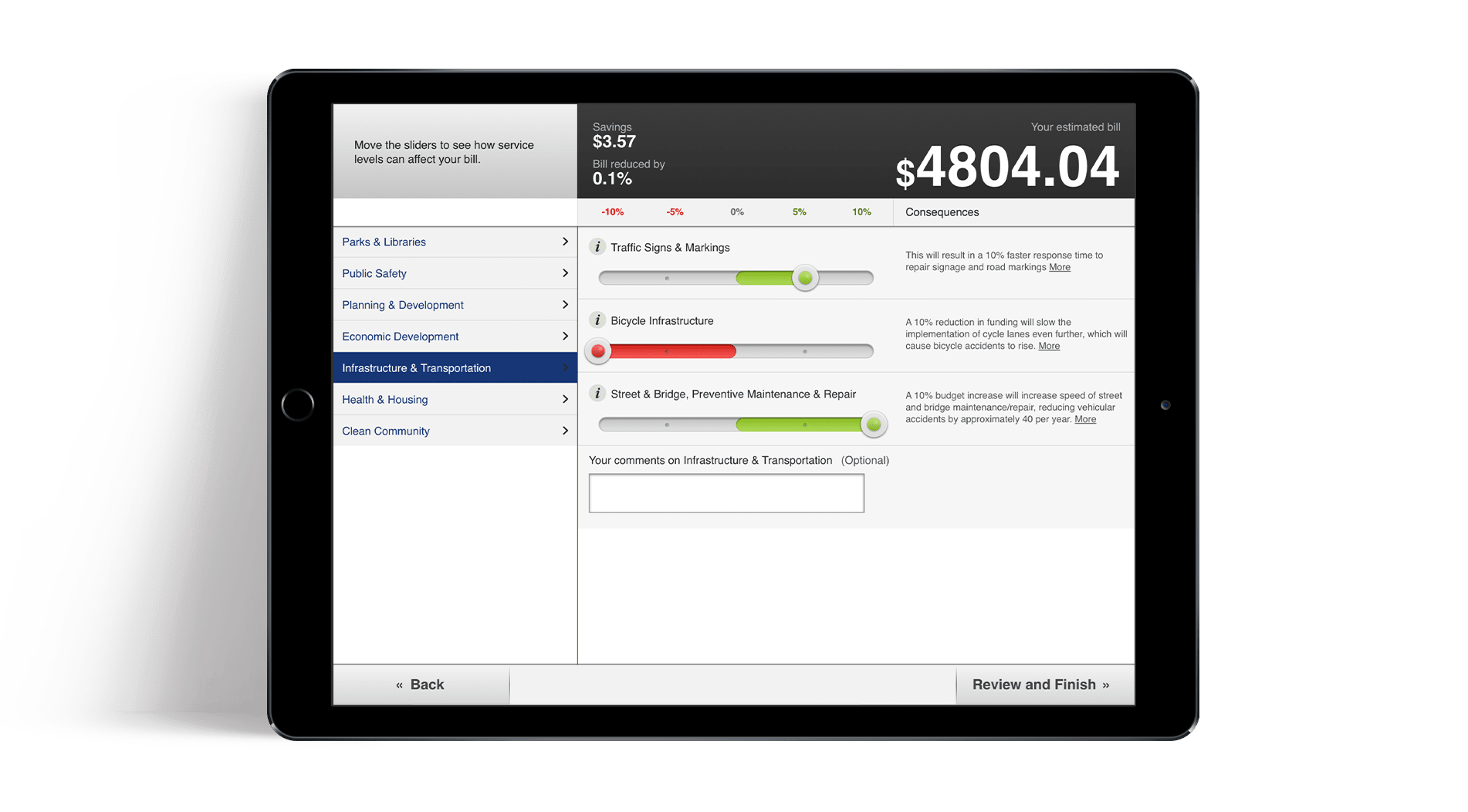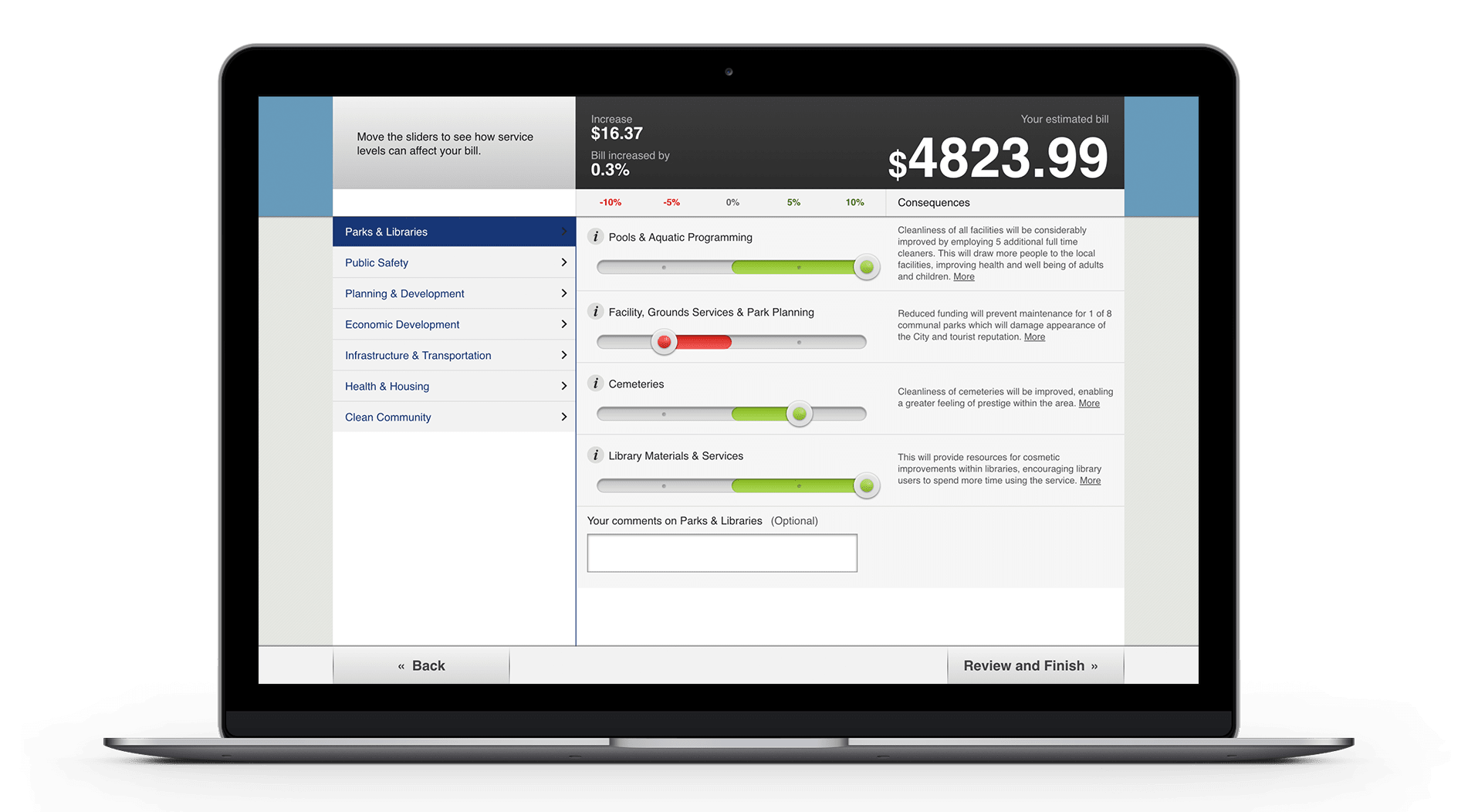Involve residents in setting property taxes or rates
Engage residents with your work
Find out which activities they want you to prioritise
See how they would balance spending vs tax
Making the connection clear between rates and services
Property rates are a common and important mechanism of government spending – but they can be seen by residents as a 'necessary evil'; a cost that is incurred but not understood. This often makes it hard to engage residents meaningfully when it comes to rate adjustments, because informed opinions are in scant supply.
It's in everyone's interest to better understand the connection between rates and the services they pay for: residents want to see what their money is spent on, so that the costs feel fair, justified and reasonable. Government and housing bodies want residents to appreciate the direct connection between service improvements and the level of property rates.
Simulator gives residents a hands-on way to explore and understand the pros and cons of rate adjustments, letting them make changes and see the consequences directly. This deliberative approach means the complementary processes of education and consultation happen in tandem.
Digital tools for gauging public priorities
In the search for engaging, accessible ways to connect with citizens, local authorities and housing organisations around the world have chosen Simulator to get public input on their property taxes and rates.
Simulator is an online interactive prioritisation tool that lets people weigh up future transport decisions for themselves.
Respondents can experiment with various possible permutations – getting to see what the likely impact of different choices would be and to understand the trade-offs at play.
Over 100 organisations have used Simulator to engage citizens in matters of spending, budget prioritisation and rate-setting.




Deliberating on personal tax bills in the City of Wichita
The City of Wichita, USA used a Bill Simulator to involve their citizens in setting their property tax rates.
By increasing, decreasing or leaving services the same, participants are able to see in real time the impact of their decisions on their specific property tax bill.
The ability to see the real time impact on their personal bill meant that participants would be more likely to respond truthfully & take more time to deliberate over their responses, therefore providing better quality answers & better informing the final decision.
We want taxpayers to feel like they have a say in the budget decisions that we make. These are the decisions that as an elected official we have to make ourselves, and we're trying to solicit as much feedback from the public. This is a new tool that we can utilize,
Jeff Blubaugh, Councilman, City of Wichita
Raise awareness of how property taxes are used
Simulator gets people to weigh up the real choices and trade-offs involved in setting property rates. It helps turn 'wish-lists' into considered preferences, with people thinking carefully about which things are most important to them.
Build understanding for the choices at hand
Simulator makes people more well-informed via the process of participation. By making the trade-offs necessary to balance resources themselves, respondents gain a new appreciation of the complexities involved.

'Pocketbook' feedback for City of Austin, Texas
Every year, the City of Austin, Texas seek community input for their budget development process through public engagement activities.
In FY2016/17, they were in a fortunate financial position in that they were not experiencing economic downturn and so were not asking people to comment on reductions to service provisions but to give ideas on how funding should be increased, maintained or decreased for different service areas.
They used a property rates Simulator to provide an online component where participants could give feedback on a very detailed scale, from the comfort of their homes.
With an expectation that large numbers of people would participate on mobile devices, Simulator was an easily accessible way to open up involvement to the widest number of residents.
Because the tool was intuitive and easy to use, participants didn’t have to lose valuable time trying to understand the technology. They were able to quickly get to the heart of the issues under consideration, deliberating which spending changes they would like to see and why. More than 1,200 people submitted responses, giving their considered, informed input on the budget development.
It’s an added value to our budget process. It serves to educate community not only about budget and how it affects their pocketbook, but also how they can get involved and get more information.
Ed Van Eenoo, Deputy Chief Financial Officer, City of Austin
Make difficult decisions easier to understand
Complex information is made clearer and more navigable by interactivity. Simulator lets people adjust simple sliders and see real-time feedback through points and consequences, giving them a hands-on grasp of the issues.
Your rates and spending engagement needs to be two-way: listening to people as well as informing them. Simulator gives you usable data about people's priorities, which can shape your plans.
Get an accurate model
Set up Simulator to reflect the realities of your situation. Create a capped annual budget, tailor respondent's adjustments to their personal tax rate or let people allocate prioritisation points.

Stay on top of everything
Control your Simulator quickly and easily with at-a-glance dashboards and settings. Access headline statistics whenever you want to monitor progress.

Generate detailed analysis
Dig into the comprehensive reporting tools to produce insightful findings. Export all data at any time to audit results and run even more analytics.

Want a real person to walk you through a live demo?
We’re happy to help out. We'll answer all your questions. We won't share your contact details.
Request a Free Demo